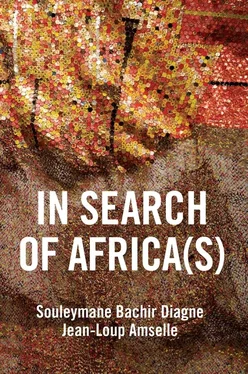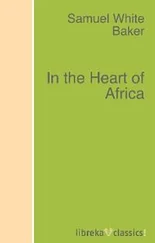Souleymane Bachir Diagne and Jean-Loup Amselle
This book of epistolary exchanges, or rather of e-mail exchanges, between the two of us, an anthropologist and a philosopher who, in some of our work, express a search for Africa(s), focuses on what might be called the question of the postcolonial.
It is difficult, for many reasons, to date precisely the appearance of a postcolonial paradigm and to ascribe it to definite writers. First of all, this term has two distinct meanings: it refers to a phenomenon that occurred ‘after’ colonization and to a phenomenon that was to ‘counteract’ colonization and its aftermath in the contemporary world, both in the South and in the North. Secondly, postcolonialism must be plural: there are as many authors as there are postcolonialisms and, within this paradigm, literary people rub shoulders with political scientists and other specialists in the humanities and social sciences, and have often played the role of precursors.
Be that as it may, the emergence of a postcolonial paradigm is doubtless to be situated in the aftermath of the Second World War. This paradigm was already gestating in a historical configuration where, even before the war, revolts and riots in countries under foreign rule indicated that this rule could no longer be maintained. The Brazzaville Conference called by de Gaulle in 1944 recognized that, if only thanks to the part played by the colonies in the liberation of Europe from Nazism, the colonial system would not survive unless it were re-established on new foundations. This system was in fact doomed, as the independence of India and Pakistan in 1947 would demonstrate.
This was also the era when the two main victorious countries in the war, the United States and the Soviet Union, confronted each other as the dominant powers. For different reasons and in different forms, they had both opposed old-style colonialism as established by Europe. This was the time, in particular, when the United States assumed the hegemony over the rest of the planet previously held by Europe, and where as a corollary the notion of ‘cultural area’ replaced the old ‘savage/civilized’ binary on which the domination of European colonial powers over Africa, Asia and Oceania had been based. The notion that there is a plurality of human cultures all equivalent to one another, a notion which lies at the heart of the American cultural anthropology of Franz Boas and his followers, also lay behind many postcolonial texts.
Perhaps the most significant event for postcolonialism was the Bandung Conference in Indonesia, in 1955. It brought together twenty-nine African and Asian countries and marked the entry onto the international scene of the decolonized countries of the so-called ‘Third World’. In the final resolution of this conference, colonialism and imperialism in general were condemned, especially in France (then one of the two main colonial powers in Africa) and in the apartheid regime in South Africa. The participants also sought to define themselves as ‘non-aligned’ with the two big blocs of the time, the Soviet bloc and the Western bloc – a desire that may also have expressed the wish to rid themselves of the ideologies dominant in each of these two areas.
Some of the ideas developed at the Bandung Conference can be found in authors who, without defining themselves literally as postcolonial writers, may nevertheless be considered as precursors. We particularly have in mind Aimé Césaire and his famous ‘Letter to Maurice Thorez’ (1956), in which he announced his resignation from the French Communist Party and simultaneously denounced the ‘omnilateral’ superiority of the West and the ‘emaciated universalism’ that it promoted. In this letter, we can read a desire to promote ‘cultural relativism’ and regenerate the Caribbean in contact with Black Africa, defined as ‘the mother of our Caribbean culture and civilization’. We can also, conversely, take seriously what Césaire himself says about his aims: a ‘universal’ that would be different from colonial paternalism or the fraternalism of the French Communist Party, a ‘universal’ that would be ‘rich with all particulars’. These two readings constitute one aspect of our discussion of the question of the universal.
In the Anglo-Saxon universe there is another major figure, also claimed today by postcolonials, namely the American-Palestinian writer Edward Said and his celebrated Orientalism (first published in the United States in 1978 and translated into French in 1980). 1In this book, Said drew on the work of Michel Foucault and on the analysis of mainly literary texts to show that the societies of the Near East and the Middle East, as we currently apprehend them, are the result of a construction and projection of Western and colonial stereotypes about social realities that are actually far richer and more complex.
At the crossroads of the French- and English-speaking worlds, and also following in the wake of Foucault’s ideas, was Valentin Mudimbe’s magnum opus: The Invention of Africa (1988). 2In this fundamental work, Mudimbe set out to describe the rigid representations of Africa that then prevailed by forging the concept of the ‘colonial library’, which designated all the knowledge and texts relating to this continent produced by conquerors, missionaries and colonial administrators.
In short, the genealogy of postcolonialism(s) is very varied, and the search for precursors could extend to infinity. However, as far as the development of the postcolonial paradigm is concerned, it is crucial these days to emphasize the importance assumed by meetings and collaborations between researchers and academics from India, Latin America and Africa. These meetings comprise first and foremost, of course, the ways in which these people read each other’s works.
Then there are the physical meetings organized by institutions like CODESRIA 3in Africa, which, twenty years ago, in collaboration with the International Center for Ethnic Studies (ICES) based in Colombo, Sri Lanka, created a review published twice a year and dedicated to dialogue between researchers from Africa and Asia under the title Journal of Identity, Culture & Politics: An Afro-Asian Dialogue . We could also mention the Consejo Latinoamericano de Ciencias Sociales or Latin American Council of Social Sciences (CLACSO) in South America.
Meetings between teachers and researchers from Africa, Asia and Latin America also take place in American universities, where, as is well known, many nationalities are to be found. So postcolonial studies has found a home in the major universities of the United States, giving birth to a whole series of outstanding works, all dominated by the idea, made famous by the American-Indian historian Dipesh Chakrabarty, of ‘provincializing Europe’. 4This involves making Europe one cultural area like any other, that is, rejecting the idea that it has any pre-eminence in the field of knowledge, and thus denying it the privilege of naturally embodying universalism. Instead, it is the plurality of cultural spaces which is affirmed – African, Asian, Native American and Oceanian – as well as the equal dignity of endogenous systems of thought, philosophies, epistemologies and types of knowledge.
In their critiques of Western domination over the rest of the planet, various types of postcolonialism have highlighted the significance of the transatlantic slave trade and colonization in the process of capitalist accumulation. In recent years, this paradigm has, however, also given way to another intellectual configuration, namely the ‘decolonial paradigm’. As part of this new paradigm, the pivotal year for the critique of capitalism is 1492, which simultaneously saw the ‘discovery’ or the ‘invasion’ of America, depending on one’s point of view, and the completion of the ‘Reconquest’ of the Iberian Peninsula by Christian rulers, which involved the end of Muslim Andalusia and the expulsion of the Jews from Spain. The system of domination thereby established is thus seen by decolonial authors not as linked to the ‘Industrial Revolution’ of the eighteenth century, but as arising from the invasion of America, the expulsion of Muslims and Jews from Spain and the subsequent process of ethnic cleansing.
Читать дальше












